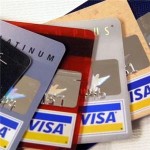What are Chargebacks?
 ‘Chargeback‘ is a financial term, referring to the process of returning funds to a consumer, reversing an outgoing transfer from their credit or debit card – effectively, a refund. They usually relate to transactions which are suspected to be fraudulent or unfair: if a consumer purchases goods or services using a credit or debit card and the seller fails to comply with the terms specified, the consumer may request one from their credit or debit card issuer.
‘Chargeback‘ is a financial term, referring to the process of returning funds to a consumer, reversing an outgoing transfer from their credit or debit card – effectively, a refund. They usually relate to transactions which are suspected to be fraudulent or unfair: if a consumer purchases goods or services using a credit or debit card and the seller fails to comply with the terms specified, the consumer may request one from their credit or debit card issuer.
Chargebacks and Merchant Accounts
Many businesses and retailers choose to set up a merchant account with an online merchant account service, which enables them to accept credit and debit card payments for online transactions. All major credit cards can be used. Liability for chargebacks falls upon the credit card issuer, which means that all merchant service providers are closely examined to ensure that they will not carry out fraudulent activity, which would be potentially costly. Merchant account service providers are expected to respond promptly to requests for chargebacks.
When are Chargebacks Requested?
The main reasons for requesting one are that the goods purchased never arrived, the goods were significantly different than described, or that the transaction was carried out without the cardholder’s permission. Chargebacks exist to protect consumers, and have become particularly important as more and more people make purchases through online retailers.
The Process of a Chargeback
 The first stage in the process is a request from the buyer for a refund from their card company. The card company will then notify the online merchant’s bank responsible for the transaction (such as Merchant Warehouse or Charge.com, amongst many others). The seller’s funds involved in the transaction are temporarily placed on hold while the dispute is ongoing. The credit card company and the online merchant’s bank will request information from the seller regarding a potentially fraudulent transaction, and if there is evidence of unlawful activity, the charge back will be authorized.
The first stage in the process is a request from the buyer for a refund from their card company. The card company will then notify the online merchant’s bank responsible for the transaction (such as Merchant Warehouse or Charge.com, amongst many others). The seller’s funds involved in the transaction are temporarily placed on hold while the dispute is ongoing. The credit card company and the online merchant’s bank will request information from the seller regarding a potentially fraudulent transaction, and if there is evidence of unlawful activity, the charge back will be authorized.
In some cases, the merchant’s bank may deal directly with the credit card company, or there may be an intermediary such as PayPal, who will settle the dispute with recourse to the Operating Regulations that the merchant’s bank agreed to. A chargeback usually involves an additional fee for processing the complaint and issuing a refund. In many cases, the fee to the merchant is between $15 and $30, plus the cost to carry out the transaction and the sum being processed.
Best Merchant Account Credit Card Services in 2026
| Rank | Service | Rating | More Info |
|---|---|---|---|
 |  |      |  |  |      |  |  |      |  |  |      |  |  |      |

